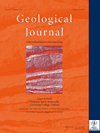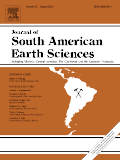
Boletim Paranaense de Geociencias
Scope & Guideline
Innovating Geological Understanding for Tomorrow's Challenges
Introduction
Aims and Scopes
- Geological and Environmental Studies:
The journal publishes research related to geological formations, sediment analysis, and environmental impacts, emphasizing the geological history and current dynamics of Brazilian regions. - Paleoenvironmental and Paleontological Research:
Papers often explore ancient ecosystems and fossil records, providing insights into geological time scales and past climate conditions, which are crucial for understanding current environmental changes. - Geochemical and Petrological Investigations:
Research on the chemical composition and mineralogy of rocks and sediments is a core focus, aiding in the understanding of resource distribution and geological processes. - Remote Sensing and Computational Methods:
The use of modern computational tools and remote sensing techniques is frequently highlighted, showcasing innovative methodologies for geological and environmental assessments. - Education and Outreach in Geosciences:
The journal also addresses educational methodologies in geosciences, focusing on the teaching of geological concepts in academic settings.
Trending and Emerging
- Environmental and Ecological Studies:
There is an increasing focus on environmental assessments, particularly regarding the impacts of human activities on ecosystems, which is crucial for sustainable development. - Use of Advanced Technology in Geoscience Research:
Emerging themes include the application of remote sensing and geospatial analysis, showcasing innovative methodologies that enhance data collection and interpretation. - Interdisciplinary Approaches:
Research that integrates geology with other fields such as biology, archaeology, and anthropology is gaining traction, reflecting a broader understanding of how geological processes affect diverse aspects of life. - Paleoclimatology and Climate Change Studies:
The exploration of past climates and their implications for current climate dynamics is increasingly relevant, as researchers seek to understand historical patterns to inform future predictions.
Declining or Waning
- Traditional Geological Mapping:
Research focused solely on traditional geological mapping techniques has decreased, possibly due to advancements in technology and methodologies that provide more dynamic and comprehensive data. - Static Geological Models:
Papers that rely on static models of geological formations are becoming less common, as there is a growing emphasis on dynamic processes and real-time geological changes. - Historical Geology without Modern Context:
There is a noticeable decline in studies that discuss historical geology without linking findings to contemporary environmental or ecological issues, reflecting a shift towards more integrated research approaches.
Similar Journals

GEOLOGICAL QUARTERLY
Unveiling Planetary Insights Through Rigorous Research.GEOLOGICAL QUARTERLY, published by the Polish Geological Institute, is a respected journal in the field of geology, offering insights into Earth and planetary sciences since its inception in 2000. With an ISSN of 1641-7291 and an E-ISSN of 2082-5099, this journal serves as a vital platform for researchers, professionals, and students seeking to expand their knowledge in geological disciplines. The journal is positioned in Q3 within the geology category as of 2023 and ranks #172 out of 321 in Scopus, placing it in the 46th percentile among its peers. Although currently not an open-access publication, GEOLOGICAL QUARTERLY reflects the policy of fostering scientific communication and collaboration by disseminating valuable geological research. Its commitment to publishing original articles, reviews, and technical notes ensures that it plays a significant role in advancing geological science and its applications within the academic community. With its base in Warsaw, Poland, the journal stands as an important resource for anyone engaged in or studying the Earth sciences.

Geosfernye Issledovaniya-Geosphere Research
Exploring the Depths of Earth and BeyondGeosfernye Issledovaniya-Geosphere Research, published by TOMSK STATE UNIVERSITY, is a significant addition to the scholarly discourse within the fields of Earth and Planetary Sciences, Ecology, and Geography. With a focus on innovative research and insights that span a broad spectrum of environmental and geographical studies, this journal aims to provide a platform for researchers and students alike to disseminate their findings and discuss pressing issues facing our planet. Though classified in the Q4 quartile for its 2023 metrics, it serves as an important venue for early-career scientists and scholars from the Russian Federation and beyond to contribute to the global dialogue surrounding geosciences. The journal operates with various access options, making it accessible to a diverse audience. It encourages submissions that inspire robust discussion and exploration of topics vital to our understanding of the geosphere and its intricate dynamics. Covering the pivotal years from 2019 to 2024, Geosfernye Issledovaniya-Geosphere Research is poised to enhance its relevancy and impact within the academic community.

Quaternary Science Advances
Transforming Knowledge in Quaternary Science and BeyondQuaternary Science Advances, published by ELSEVIER, is a distinguished open access journal that has rapidly gained recognition in the fields of Earth and Planetary Sciences since its inception in 2020. With an impressive impact factor reflected by its Q2 ranking across various categories including Earth-Surface Processes and Geology, this journal serves as a vital platform for researchers and professionals aiming to advance the understanding of Quaternary environments and processes. Positioned within the 73rd percentile in Earth and Planetary Sciences and bolstered by a robust global readership, Quaternary Science Advances not only facilitates the dissemination of high-quality research but also encourages interdisciplinary collaboration. The journal’s open access model ensures that cutting-edge findings are readily available to students, researchers, and practitioners across the globe. With a commitment to promoting innovative studies from 2020 to 2024 and beyond, this journal remains a cornerstone for advancing knowledge within the dynamic landscape of Earth sciences.

DOKLADY EARTH SCIENCES
Innovating Research in Earth Sciences Since 1998DOKLADY EARTH SCIENCES is a reputable journal published by MAIK NAUKA/INTERPERIODICA/SPRINGER, focusing on the dynamic field of Earth and Planetary Sciences. With an ISSN of 1028-334X and E-ISSN 1531-8354, this journal offers a platform for researchers to disseminate their findings and insights that contribute to our understanding of Earth systems over a continuous publishing span from 1998 to 2024. It currently holds a Q3 quartile ranking in the Earth and Planetary Sciences category, reflecting an emerging yet significant impact within its field, evidenced by its Scopus ranks where it stands at 123rd in general Earth sciences and 113th in miscellaneous Earth sciences. DOKLADY EARTH SCIENCES aims to bridge research gaps and foster collaboration among a diverse audience including researchers, professionals, and students committed to advancing knowledge in geoscience. The journal stands as a vital resource for those seeking to explore contemporary challenges and innovations within the realm of Earth sciences.

Austrian Journal of Earth Sciences
Advancing Knowledge in Geology and BeyondThe Austrian Journal of Earth Sciences, published by SCIENDO, is an esteemed open-access journal specializing in the disciplines of geology, paleontology, and stratigraphy. With an ISSN of 2072-7151, this journal has established itself as a significant platform for innovative research and scholarly communication in the earth sciences. Since its inception in 2007, it has continuously expanded its influence, achieving notable rankings in the Scopus database—#113 in Geology, #42 in Paleontology, and #21 in Stratigraphy, demonstrating its commitment to high-quality publications. The journal holds prestigious quartile rankings of Q1 in both Geology and Paleontology and Q2 in Stratigraphy as of 2023, reflecting its impact and relevance in the scientific community. Researchers and students alike are encouraged to explore and contribute to the evolving discourse within this dynamic field, as the Austrian Journal of Earth Sciences fosters collaboration and knowledge sharing across global platforms.

GEOSCIENCES JOURNAL
Unveiling the Secrets of Our Planet through Rigorous Research.Welcome to the GEOSCIENCES JOURNAL, a pivotal publication in the fields of Earth and Planetary Sciences and Environmental Science, proudly presented by the Geological Society of Korea. Established in 1997, this journal has become a prominent platform for researchers, professionals, and students, offering a rich collection of peer-reviewed articles that explore a diverse array of geoscientific topics. With an impressive Q2 ranking in both Earth and Planetary Sciences and Environmental Science categories for 2023, it stands as an essential resource in the academic community. Though it operates under a traditional subscription model, GEOSCIENCES JOURNAL remains dedicated to advancing knowledge through rigorous research. Addressed from its headquarters in Seoul, South Korea, the journal aims to foster a deeper understanding of geosciences, encouraging innovation and collaboration in tackling today’s environmental challenges.

GEOLOGICAL JOURNAL
Exploring the Earth's mysteries since 1951.GEOLOGICAL JOURNAL, an esteemed publication by WILEY, has been at the forefront of geological research since its inception in 1951. With an ISSN of 0072-1050 and E-ISSN of 1099-1034, this journal serves as a vital platform for disseminating high-quality, peer-reviewed research in the field of geology. Operating out of the United Kingdom, the journal proudly features a Scopus rank of 80 out of 321 in the Earth and Planetary Sciences category, reflecting its commitment to scholarly excellence, with a 2023 category quartile ranking of Q2. As part of its innovative approach, GEOLOGICAL JOURNAL seeks to foster interdisciplinary collaborations, advancing our understanding of earth processes, materials, and history. Although it does not offer open access options, its robust subscription model ensures that both professionals and students have access to groundbreaking insights. With a publication history that spans over seven decades, the GEOLOGICAL JOURNAL continues to be an indispensable resource for the global geological community, encouraging discoveries that shape our comprehension of the planet.

JOURNAL OF SOUTH AMERICAN EARTH SCIENCES
Pioneering Research in South American Earth SciencesJOURNAL OF SOUTH AMERICAN EARTH SCIENCES is a premier interdisciplinary journal dedicated to publishing high-quality research in the fields of Earth-Surface Processes, Geology, and Paleontology, making it an essential resource for scientists and researchers focused on South American geology and its diverse geological phenomena. Published by Pergamon-Elsevier Science Ltd in the United Kingdom, this journal has been instrumental in disseminating groundbreaking studies since 1988, showcasing contributions that push the boundaries of knowledge in Earth and Planetary Sciences. With an impressive Scopus ranking—positioning it in the 74th percentile for Paleontology and 71st for Geology—this journal not only reflects robust academic quality but also its commitment to addressing critical geological challenges in South America. Researchers will appreciate its objective of advancing understanding of geological processes while providing insights into past, present, and future Earth environments. Although available through traditional subscription models, the journal's vast repository of articles enriches the academic landscape, facilitating the sharing of vital research among professionals, students, and geological practitioners.

Frontiers of Earth Science
Transforming Understanding of Planetary ProcessesFrontiers of Earth Science is a prominent academic journal in the field of Earth and Planetary Sciences, published by Springer. With an ISSN of 2095-0195 and an E-ISSN of 2095-0209, this journal serves as a significant platform for researchers and professionals to disseminate their findings from 2007 to 2024. It is recognized for its impactful contributions within the category of Earth and Planetary Sciences, boasting a respected Q2 ranking in 2023. With a Scopus ranking of 64 out of 195, placing it in the 67th percentile, Frontiers of Earth Science continues to drive academic dialogue and innovation. The journal is dedicated to exploring a diverse range of topics, including geology, meteorology, and environmental science, and amplifying the understanding of Earth systems through rigorous research. Located in New York, USA, this journal embraces an Open Access model, ensuring that groundbreaking research is readily available to the global scientific community, thereby enhancing its accessibility and impact.

Journal of Geosciences
Pioneering Discoveries in Earth and Planetary SciencesJournal of Geosciences is a distinguished peer-reviewed journal published by CESKA GEOLOGICKA SPOLECNOST, based in the Czech Republic, that serves as a vital platform for the dissemination of innovative research in the field of Earth and Planetary Sciences. With an ISSN of 1802-6222 and E-ISSN of 1803-1943, this journal has established its significance within the academic community, evidenced by its Q3 ranking in both Earth and Planetary Sciences and Geology. The journal covers a broad array of topics, making it an essential resource for researchers, professionals, and students interested in geoscientific advancements and discoveries. The Journal of Geosciences reflects a commitment to high-quality scholarship, embracing a variety of methodologies and interdisciplinary approaches, and provides open access to its content, thereby encouraging global collaboration and knowledge sharing among geoscientists. With a publication history converging from 2007 to 2024, it continues to be a prominent venue for critical conversations and developments in the ever-evolving field of geosciences.